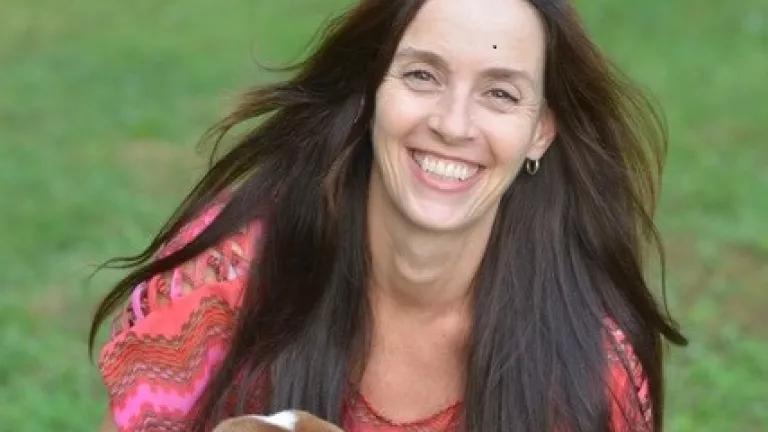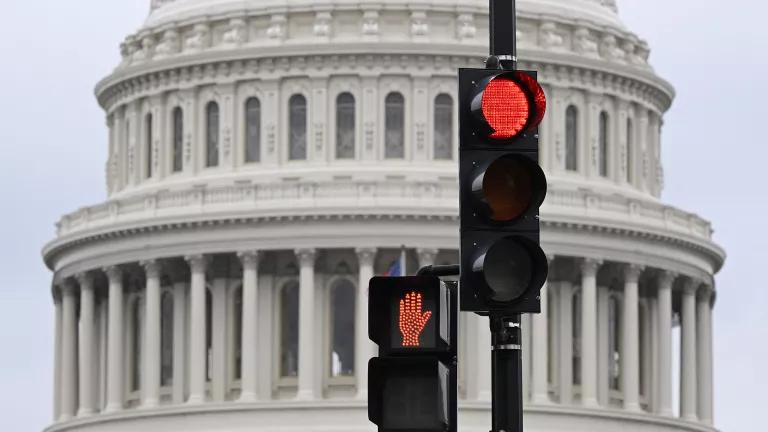When “Home” Is Hazard
More than a dozen fossil fuel subsidies in the U.S. tax code encourage companies to extract oil, gas, and coal. Often lost in the debate over esoteric tax policy is the real-world impacts of this industry on the ground.

Lois Bower-Bjornson, Center for Coalfield Justice (CCJ)
More than a dozen fossil fuel subsidies in the U.S. tax code encourage companies to extract oil, gas, and coal. Today we know how destructive it is to incentivize that: extraction pollutes our communities, destroys nature, and fuels climate change. Often lost in the debate over esoteric tax policy is the real-world impacts of this industry on the ground.
NRDC has worked with local leaders and communities in four locations around the country to understand more clearly how incentivizing the fossil fuel industry harms people. Hearing stories like these from Wilmington, CA; St. James Parish, LA; Washington County, PA and the Greater Chaco region, NM—can help all of us grasp the urgency of eliminating fossil fuel subsidies. This is the third instalment in our series.
Thank you to Center for Coalfield Justice for partnering with us in telling the story of how fossil fuel extraction affects people in Pennsylvania’s Washington County. For more information on the Center for Coalfield Justice’s work to protect public health, nature and human rights in Pennsylvania communities please visit centerforcoalfieldjustice.org.
Washington County, Pennsylvania
Pennsylvania’s rural Washington County has picturesque rolling fields, scenic woods, and hills sprinkled with farmhouses. It is also the most heavily fracked county in the state, with a whopping 2,700 active wells in its 861 square miles.[i]
Shale fracking began in Pennsylvania communities 15 years ago, and since then, families have expressed concerns about deteriorating air and water quality and increasing health symptoms. There have been hundreds of complaints of contaminated drinking water sources.[ii] People living near wells have reported nosebleeds, burning eyes, sore throat, stomach pain and nausea, headaches, respiratory, and neurological symptoms.[iii] Studies have found that children living within a mile of a well site in Pennsylvania have higher risk of hospitalization for asthma,[iv] and more than 3,200 children in Washington County have pediatric asthma.[v]
For years, communities have been concerned about the dangers of oil and gas wells, along with the toxic oil and gas waste generated, stored, transported, and disposed of in their communities.
In 2019, investigators collected air, water, and urine samples from five southwestern Pennsylvanian families and tested them for dangerous chemicals associated with fracking. The families living closer to fracking wells were statistically more likely to have certain compounds in their urine.[vi]
Families in Washington County have noted dozens of diagnoses in young adults of Ewing's sarcoma, a rare cancer that develops in the bones and soft tissues, and question whether those are linked to nearby fracking activities. There’s alarming evidence that elevated levels of contaminants related to oil and gas waste, such as radium, have found their way into local drinking water sources.[vii]
The Bower-Bjornson family lives within a mile of 22 active wells in Washington County.[viii] Each family member had elevated levels of chemicals linked to health harms such as respiratory and gastrointestinal problems, skin and eye irritation, organ damage, reproductive harm, and increased cancer risk.
Lois Bower-Bjornson is a board member of the Center for Coalfield Justice (CCJ) and an organizer for the Clean Air Council. CCJ is a local grass roots organization working to improve oversight of fossil fuel extraction, empower local residents, and protect public and environmental health. She disagrees with the assumption that fracking brings jobs and shared prosperity: “Tax breaks aren't really helping the community. They always talk about jobs, but there’s not really jobs here. These tax breaks are just big handouts to oil and gas companies.”
Washington County communities continue to suffer from the ills of fracking as new wells are drilled on super-sized well pads.
CCJ is working with community members to protect our health from hazardous waste from oil and gas production by advocating to strengthen regulations for waste management.
Congress Must Act to End Fossil Fuel Freebies Now
State officials must stop the expansion of fossil fuel infrastructure in communities like Washington County. And at the federal level, Congress must also ensure that that we do not further incentivize this dirty and destructive industry through taxpayer dollars. Ending fossil fuel giveaways is a no-brainer and an essential step in the effort to eliminate the industry’s threat to communities, nature, and the planet’s future.
[iii] https://www.environmentalhealthproject.org/health-issues/air; See also: Wypijewski, JoAnn, “What Happened When Fracking Came to Town,” The New York Times, July 31, 2018, https://www.nytimes.com/2018/07/31/books/review/eliza-griswold-amity-an…



